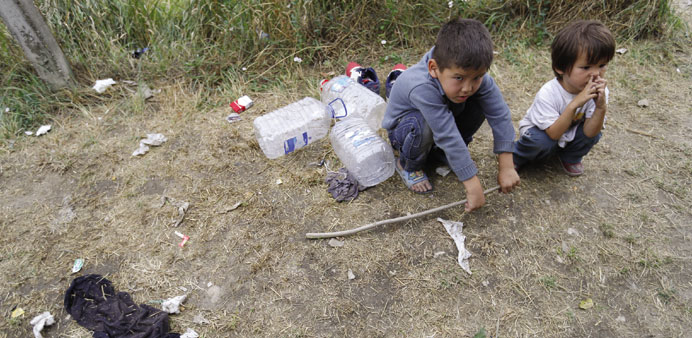Children of Afghan migrants wait yesterday for water outside a brick factory in Subotica, Serbia. They are headed with their families across the border to Hungary and into the EU.
DPA/Berlin
The car of a left-wing politician who has organised pro-asylum rallies was blown up yesterday as Germany sees a rise in violence against asylum seekers.
“We cannot let those who openly promote hatred against people to take over the streets,” said Michael Richter, who heads up the hard-left Die Linke party (The Left party) on the regional council in the small eastern German town of Freital, which has been the focus of a series of anti-refugee protests in recent weeks.
Richter said he heard a bang before dawn and saw a cloud of black smoke rising above his car in Freital.
Die Linke blamed the blast on right-wing extremists.
The budgets of many German states and regional governments are under pressure as they try to meet the high cost of accommodating the large numbers of asylum seekers in the nation.
Germany takes in the largest absolute number of refugees among EU countries each year.
About 450,000 people are expected to apply for asylum in Germany in 2015 as the European Union sees an unprecedented influx of asylum seekers from countries including war-torn Syria, Afghanistan, the Palestinian territories and Kosovo.
State expenses related to processing and accommodating migrants are expected to more than double this year to €5bn ($5.49bn) from €2.2bn in 2014.
However, Chancellor Angela Merkel’s government tried yesterday to play down calls from German states to boost the funds to help meet the cost of a surge in the numbers of refugees entering the country.
An interior ministry spokesman said the federal government had already pledged to double its contribution to €1bn euros for this year.
In addition, the spokesman said a working group of federal and state governments agreed last month to draw up proposals on how to proceed with meeting the escalating cost of housing the refugees.
Underlining the sense of crisis, one German state called yesterday on Berlin to further open up vacant army barracks to house refugees.
“The federal government should help out quickly by ensuring that suitable vacant army barracks can be used for the accommodation of refugees,” said Ralf Jaeger, the interior minister for the western German state of North Rhine Westphalia.
The defence ministry has already made available eight barracks housing about 3,500 people and is considering what further steps it could take, a ministry spokesman said.
Defence Minister Ursula von der Leyen promised yesterday “maximum goodwill” in helping to meet the housing needs of the refugees.
The federal government has also sought to ease the burden on the states by reducing the amount of time to process asylum claims, the interior ministry spokesman said.
The average length of time needed for processing has now fallen from 7.1 to 5.3 months.
Added to the financial problems facing the states in meeting the costs of the refugees are the political tensions that have been unleashed as a result of the rise in asylum seekers.
This has escalated into violence in parts of the country with a group from Germany’s extremist right attacking their opponents at a rally in Dresden in the eastern part of the country on the weekend.
In another part of Dresden, stones were thrown at a former hotel being converted into a home to accommodate refugees.
Four Syrian asylum seekers in a small town in Thuringia were also attacked and beaten up.
On Saturday night, a refugee family awoke to a find fire in their apartment in the eastern state of Brandenburg after someone had doused a newspaper in fire accelerant and thrown it at the apartment’s front door.

